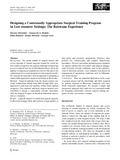Designing a contextually appropriate surgical training program in low-resource settings: the Botswana experience
Date
2012-08-01Author
Mutabdzic, Dorotea
Alemayehu, Bedada G.
Bakanisi, Balisi
Motsumi, Joseph
Georges, Azzie
Publisher
Socie´te´ Internationale de Chirurgie, http://www.iss-sic.com/index.php?id=3Rights holder
Socie´te´ Internationale de ChirurgieType
Published ArticleMetadata
Show full item recordAbstract
Background
The global burden of surgical disease and severe shortage of trained surgeons around the world are now widely recognized. The greatest challenge in improving access to surgical care lies in sub-Saharan Africa, where the number of surgeons per population is lowest. One part of the solution may be to create programs to train surgeons locally. We present our experience with an approach to designing a contextually appropriate surgical curriculum in Botswana.
Methods
Surgical logbooks from the largest tertiary care center in Botswana, dating from 2004 through 2010, were analyzed to yield total case numbers within clearly defined categories. Case numbers and local surgical opinion were combined to design a contextually relevant curriculum, with the Surgical Council on Resident Education curriculum as a template.
Results
Logbook analysis revealed that general surgeons in Botswana manage burns and perform a large number of skin grafts and extremity amputations. However, they perform few colonoscopies and complex laparoscopic procedures. The new curriculum included greater emphasis on surgical subspecialty procedures and surgical management of locally relevant conditions, such as the complications of infectious diseases. Less emphasis was placed on management of uncommon conditions such as inflammatory bowel disease.
Conclusions
There are important differences in the scope of general surgery and the knowledge and skills required by general surgeons in Botswana compared with their North American counterparts. We present a simple and inexpensive approach that could serve as a potential model for designing contextually relevant surgical training programs in other low-resource settings.

